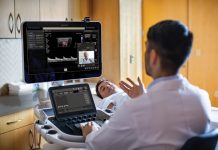Active research in epidermal electronics has spawned an essential class of wearable sensors that aim to deliver point of care diagnostics with comfortable and robust user experience. Conventional medical devices are bulky, rigid, and non-practical because they do not allow continuous monitoring of vital health parameters while continuing day-to-day life schedules. The soft and curvilinear shape of the human body needs skin like sensors that can be tattooed on the body with an easy transfer process.
Dr Saurabh Kumar from Centre for Nanoscience and Engineering (CeNSE) at Indian Institute of Science, Bangalore, India, a recipient of the INSPIRE Faculty Fellowship instituted by the Department of Science and Technology, Government of India is currently working on wearable sensors that can retract information from human body using its largest organ, the skin.
In his recent work published in the journal ‘ACS Sensors’, his group has fabricated a skin conformal tattoo sensor about 20 μm thick. The sensor promises inconspicuous and continuous monitoring of an individual’s vital health parameters, like pulse rate, respiration rate, and surface electromyography. The sensor serves as a single conduit for sensing respiration rate and pulse, dispensing with the need to mount multiple sensors. Its remarkably high sensitivity with a gauge factor (GF) has been ascribed to the development of nano-cracks and their propagation through the film upon application of strain. The fast response and highly repeatable sensor follow easy fabrication steps and can be patterned into any shape and size using a laser.
The skin conformal sensor can perform non-invasive and continuous monitoring of vital health parameters. Further, it has the potential to replace rigid and bulky health monitoring devices.
These sensors do not interfere with the user’s daily activities, thus enabling continuous monitoring of vital signs like pulse rate, respiration rate, UV rays exposure, skin hydration level, glucose monitoring, and so on.
Apart from pursuing his research on sensors, Kumar is also training students in cutting-edge research in biosensor technologies while actively engaging them in developing tools for bio-research and clinical diagnosis.








